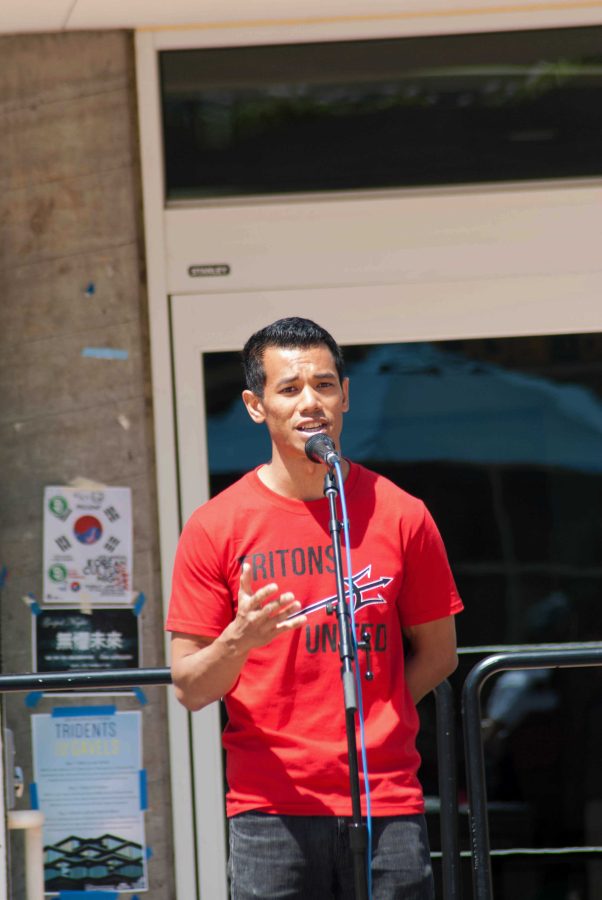Presidential and vice-presidential candidates for A.S. Council elections participated in public debates at Price Center Plaza on April 2 and 3. Candidates received three minutes to answer each of five questions on issues, such as student spaces and finances.
Tritons United presidential candidate and Earl Warren College senior Dominick Suvonnasupa expressed hope of enacting a liaison program to raise the voter-turnout rate above the historic 20 percent.
“We have proposed organization within A.S. [Council] to make it more student-centered,” Suvonnasupa said. “We’d go out and talk to them and get an idea of what they need and what they want. That way, when we propose leg changes and ideas we can meet with them directly via our liaison program.”
His vice-presidential candidate, Warren College junior Bryan Dierking, proposed
creating a new office of publicity to increase student awareness of issues.
Presidential candidate for Students Determined and Eleanor Roosevelt College senior Travis Miller similarly spoke of instituting weekly visits to student organizations and emphasized the importance of being accessible to students, insisting that A.S. Council meetings should not be the only time that students and representatives are able to interact.
Muir College junior Taylor Valdivia and Marshall College junior Krystl Fabella, Students Determined vice-presidential candidates of student affairs and external affairs, respectively, spoke of making campus politics relevant to student organizations again. Both candidates stressed their belief in transparency over publicity.
Candidates were then asked for their stances on the closing of student spaces, including the ongoing fight to keep the Che Cafe open.
Miller called student-run organizations the lifeblood of campus and emphasized the need to discuss future plans for the spaces.
“It’s time that someone on this campus started talking about what will happen to these spaces,” Miller said. “What will happen to the Che [Cafe]?”
Suvonnasupa agreed that student-run spaces are essential to the campus, but added that if the Che Cafe was not reaching enough students, perhaps it was time for the space to be reallocated.
“As leaders, I feel it’s important to not let personal opinions get in the way,” Suvonnasupa said. “If it’s not producing enough utility to student population perhaps there are other communities that would like to utilize the space.”
In regards to tuition hikes, all candidates agreed that blame could be placed partly on the state, which has cut spending over the last few years. Increasing voter turnout to state elections was cited as a possible solution to making student voices heard.
Fabella emphasized holding the UC Board of Regents responsible through ongoing protests.
“We’ve seen in the past months how students are able to shape politics and able to put direct pressure on the board,” Fabella said. “We need to prioritize holding the regents accountable.”
Dierking proposed polling the student body to learn how many students would support the athletics program moving into Division I. He emphasized that the decision ultimately belongs to students.
The candidates for Students Determined also showed support for a sustainable move toward Division I sports, but stressed that it be made without financially burdening students.
At the end of the debate, the floor was opened to questions from the audience. Candidates were asked if they supported the proposed UCEN referendum, which will be on the ballot next week, and if passed would increase student fees in order to support the maintenance, repair and operation of UC facilities like Price Center.
All candidates claimed support for the referendum, citing the importance of these resources to students.








